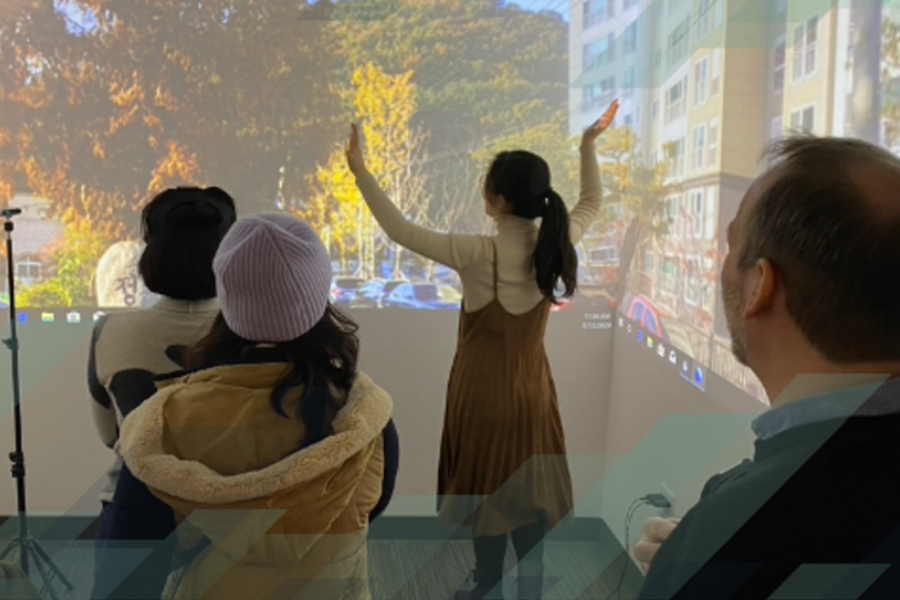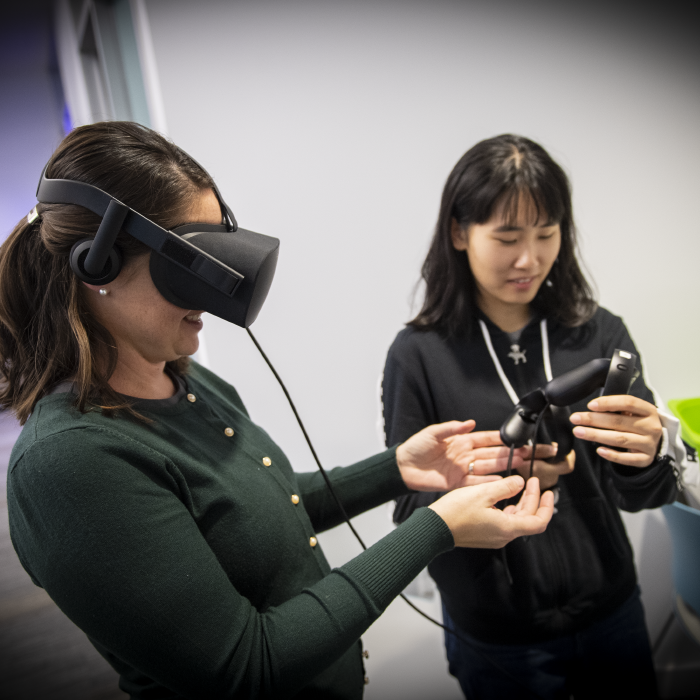
Immersive Technology is Changing CMU Courses
By Meghan Marino
This story has been edited, as of October 2024, to reflect recent name changes.
New courses at Carnegie Mellon University are combining the talent of the Department of Languages, Cultures & Applied Linguistics (LCAL) [formerly Modern Languages], the School of Art and Integrative Design, Arts and Technology (IDeATe) all together under one, collaborative initiative. The Immersive Cultural Innovation Fund is changing the way storytelling is approached in the classroom.
The Immersive Cultural Innovation Fund supports the development and introduction of courses that explore storytelling through media elements such as virtual reality and immersive installation. The fund recently supported the introduction of the courses “Comparative China: Perceptions through TikTok and Youtube” taught by Gang Liu from LCAL and “Real-Time Animation” by Johannes DeYoung from IDeATe.
These courses take place in The Kenner Room [formerly the Askwith Kenner Global Languages & Cultures Room], which uses cutting-edge technology to create an immersive space for the Tartan community to expand their global and cultural understanding.
Director of The Kenner Room, Stephan Caspar, looks forward to the opportunity to collaborate with departments across CMU to give immersive technology a larger focal point on campus. “This is the first in a series of projects that we are hoping to fund, to further collaborative work between scholars in LCAL and Art, Design and Media,” said Caspar. “Immersive technologies provide powerful storytelling opportunities, and the group looks forward to creating interactive and engaging experiences for audiences, inviting exploration on a variety of themes in culture, language and identity.”
Caspar discussed future projects that will be supported through the fund. Plans include the creation of a summer immersive storytelling workshop on Chinese culture, a series of performances and installations, and a second course listed in the newly proposed Humanist XR minor hosted by LCAL for IDeATe.
Recent project developments have been accelerated through the founding of the Immersive Cultural Innovation Fund, a fund created by the visions and contributions of none other than 2006 Carnegie Mellon University alumnus, Henry Ha.
When Ha arrived on Carnegie Mellon University’s campus, he was unsure what path he wanted to pursue. “When I first arrived on campus as a freshman, unlike many of the incredibly talented and focused minds around, I was not particularly good at anything, and I had no idea what to do in life,” said Ha, who was initially enrolled as an undecided major.
Ha accredits much of his soul searching to the flexibility of CMU’s curriculum, which allowed him to explore a wide range of courses from Intro to Programming, and Econ 101, to courses such as Astronomy, and Russian Literature, Music and Art. Eventually, he decided to declare a major in Business with a minor in Computational Finance.
Ha is currently the founder and CEO of Metcold Group Limited, a leading food supply chain infrastructure service located in China. He also serves as the President of the CMU Beijing Network where he establishes connections for individuals who are curious about CMU, builds the local Tartan community through event organization, and raises awareness on current giving opportunities.
COVID-19, however, presented a unique set of challenges when organizing events for the CMU Beijing Network. After hosting virtual events, Ha started to notice the unique opportunities that virtual meeting technologies offer for communication and interaction. “I believe that as technologies become more sophisticated, the quality of virtual interaction between people will improve, which will eventually transform the way people communicate,” said Ha.
This fascination with virtual communication and interaction led to Ha’s personal interest in the Immersive Cultural Innovation Fund and the role of storytelling in CMU’s courses.

“I believe storytelling is the most important skill in life that no one talks about. It is the very essence of communication. A good story needs to speak to one’s heart and prompt desired actionable response,” said Ha. “All meaningful works can be understood through the lens of storytelling.”
Ha also aligns closely with how classrooms can be influenced by immersive technology. “I believe virtual reality and immersive installation, or tools evolved from these technologies will become essential means for every effective storyteller,” said Ha.
The Kenner Room has big plans for future projects that explore innovative and immersive projects. “As new projects develop, we will be opening up opportunities for new works, including digital installations and cultural experiences, alongside a program of workshops and summer courses,” said Caspar. “This collaboration explores new ways of working for LCAL and offers a deep connection to materials, stories and expertise to support artistic creation.”

 Experience immersive technology first-hand and learn more about
Experience immersive technology first-hand and learn more about